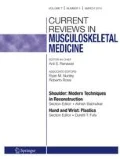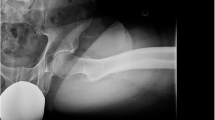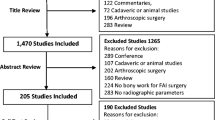Abstract
There has been an increasing body of literature regarding arthroscopic management of femoroacetabular impingement (FAI). Refinement of arthroscopic techniques has allowed for more complete management of FAI, and meta-analysis and systematic reviews have shown comparable outcomes to surgical hip dislocation with appropriate indications. There are still, however, pathomorphologies that are not accessible or much more challenging to address arthroscopically, and open corrective procedures should be considered in these situations. Extra-articular FAI is receiving increased attention and can be secondary to anterior inferior iliac spine/subspine impingement, trochanteric-pelvic impingement, and ischio-femoral impingement. Femoral and acetabular version and their impact on hip stability as well as the concept of impingement induced instability are being increasingly recognized. Acetabular labral and capsular management and repair techniques have also received increased attention. Finally, 3-dimensional imaging and dynamic software analysis are beginning to emerge as potential tools to better evaluate hip pathomorphology.


Similar content being viewed by others
References
Papers of particular interest, published recently, have been highlighted as: • Of importance
Lavigne M, Parvizi J, Beck M, et al. Anterior femoroacetabular impingement: part I. Techniques of joint preserving surgery. Clin Orthop Relat Res. 2004;418:61–6.
Beck M, Leunig M, Parvizi J, et al. Anterior femoroacetabular impingement: part II. Midterm results of surgical treatment. Clin Orthop Relat Res. 2004;418:67–73.
Ganz R, Parvizi J, Beck M, et al. Femoroacetabular impingement: a cause for osteoarthritis of the hip. Clin Orthop Relat Res. 2003;417:112–20.
Ferguson SJ, Liechti EF, Tannast M. Joint degeneration pattern in severe pincer impingement and its implications for surgical therapy. In: 2012 ORS annual meeting program. Rosemont, IL: Orthopaedic Research Society, 2012.
Büchler L, Neumann M, Schwab JM, et al. Arthroscopic versus open cam resection in the treatment of femoroacetabular impingement. Arthroscopy. 2013;29:653–60.
Bedi A, Zaltz I, De La Torre K, Kelly BT. Radiographic comparison of surgical hip dislocation and hip arthroscopy for treatment of cam deformity in femoroacetabular impingement. Am J Sports Med. 2011;39(Suppl):20S–8S.
Ng VY, Arora N, Best TM, Pan X, Ellis TJ. Efficacy of surgery for femoroacetabular impingement: a systematic review. Am J Sports Med. 2010;38:2337–45.
Botser IB, Smith Jr TW, Nasser R, Domb BG. Open surgical dislocation vs arthroscopy for femoroacetabular impingement: a comparison of clinical outcomes. Arthroscopy. 2011;27:270–8.
Clohisy JC, St John LC, Schutz AL. Surgical treatment of femoroacetabular impingement: a systematic review of the literature. Clin Orthop Relat Res. 2010;468:555–64.
Matsuda DK, Carlisle JC, Arthurs SC, Wierks CH, Philippon MJ. Comparative systematic review of the open dislocation, mini-open, and arthroscopic surgeries for femoroacetabular impingement. Arthroscopy. 2011;27:252–69.
Bedi A, Chen N, Robertson W, Kelly BT. The management of labral tears and femoroacetabular impingement of the hip in the young, active patient. Arthroscopy. 2008;24:1135–45.
• Hetsroni I, Larson CM, Dela Torre K, et al. Anterior inferior iliac spine deformity as an extra-articular source for hip impingement: a series of 10 patients treated with arthroscopic decompression. Arthroscopy. 2012;28:1644–53. This case series reported on 10 patients that underwent an arthroscopic subspine/AIIS decompression for prior avulsion injury. At a mean 14.7 month follow-up the modified HHS improved a mean 34 points and hip flexion range of motion improved a mean 18 degrees. This further supports the concept of various patterns of extra-articular hip impingement and the fact that impingement is more than just an acetabular rim and femoral head-neck junction disorder in some patients.
Hetsroni I, Poultsides L, Bedi A, Larson CM, Kelly BT. Anterior Inferior Iliac Spine Morphology Correlates With Hip Range of Motion: A Classification System and Dynamic Model. Clin Orthop Relat Res. 2013. doi:10.1007/s11999-013-2847-4.
Larson CM, Kelly BT, Stone RM. Making a case for anterior inferior iliac spine/subspine hip impingement: three representative case reports and proposed concepts. Arthroscopy. 2011;27:1732–7.
Macnicol MF, Makris D. Distal transfer of the greater trochanter. J Bone Joint Surg Br. 1991;73:838–41.
Leunig M, Ganz R. Relative neck lengthening and intracapital osteotomy for severe Perthes and Perthes-like deformities. Bull NYU Hosp Jt Dis. 2011;69 Suppl 1:S62–7.
Siebenrock KA, Steppacher SD, Haefeli PC, Schwab JM, Tannast M. Valgus Hip With High Antetorsion Causes Pain Through Posterior Extraarticular FAI. Clin Orthop Relat Res. 2013. doi:10.1007/s11999-013-2895-9.
Taneja AK, Bredella MA, Torriani M. Ischiofemoral impingement. Magn Reson Imaging Clin N Am. 2013;21:65–73.
Stafford GH, Villar RN. Ischiofemoral impingement. J Bone Joint Surg Br. 2011;93:1300–2.
Buller LT, Rosneck J, Monaco FM, et al. Relationship between proximal femoral and acetabular alignment in normal hip joints using 3-dimensional computed tomography. Am J Sports Med. 2012;40:367–75.
Fabricant PD, Bedi A, De La Torre K, Kelly BT. Clinical outcomes after arthroscopic psoas lengthening: the effect of femoral version. Arthroscopy. 2012;28:965–71.
Steppacher SD, Albers CE, Siebenrock KA, Tannast M, Ganz R. Femoroacetabular impingement predisposes to traumatic posterior hip dislocation. Clin Orthop Relat Res. 2013;471(6):1937-43. doi:10.1007/s11999-013-2863-4.
Manner HM, Mast NH, Ganz R, Leunig M. Potential contribution of femoroacetabular impingement to recurrent traumatic hip dislocation. J Pediatr Orthop B. 2012;21:574–8.
Krych AJ, Thompson M, Larson CM, Byrd JW, Kelly BT. Is posterior hip instability associated with cam and pincer deformity? Clin Orthop Relat Res. 2012;470:3390–7.
• Duthon VB, Charbonnier C, Kolo FC, et al. Correlation of clinical and magnetic resonance imaging findings in hips of elite female ballet dancers. Arthroscopy. 2013;29:411–9. This recent study supports the concept of extreme ROM induced FAI. They evaluated impingement tests, hip range of motion, and MRI findings (additional splits position for dancers) in professional female ballet dancers compared with healthy matched females. Hip MRI’s for dancers in the splits position revealed femoral head subluxations and labral and chondral pathology that was typically postero-superior compared with antero-superior in location for non-dancers.
Kolo FC, Charbonnier C, Pfirrmann CW, et al. Extreme hip motion in professional ballet dancers: dynamic and morphological evaluation based on magnetic resonance imaging. Skeletal Radiol. 2013;42:689–98.
Ferguson SJ, Bryant JT, Ganz R, Ito K. The influence of the acetabular labrum on hip joint cartilage consolidation: a poroelastic finite element model. J Biomech. 2000;33:953–60.
Espinosa N, Rothenfluh DA, Beck M, et al. Treatment of femoroacetabular impingement: preliminary results of labral refixation. J Bone Joint Surg. 2006;88A:925–35.
Larson CM, Giveans MR. Arthroscopic debridement vs refixation of the acetabular labrum associated with femoroacetabular impingement. Arthroscopy. 2009;25:369–76.
Larson CM, Giveans MR, Stone RM. Arthroscopic debridement vs refixation of the acetabular labrum associated with femoroacetabular impingement: mean 3.5-year follow-up. Am J Sports Med. 2012;40:1015–21.
Krych AJ, Thompson M, Knutson Z, Scoon J, Coleman SH. Arthroscopic labral repair vs selective labral debridement in female patients with femoroacetabular impingement: a prospective randomized study. Arthroscopy. 2013;29:46–53.
Cadet ER, Chan AK, Vorys GC, Gardner T, Yin B. Investigation of the preservation of the fluid seal effect in the repaired, partially resected, and reconstructed acetabular labrum in a cadaveric hip model. Am J Sports Med. 2012;40:2218–23.
Philippon MJ, Briggs KK, Hay CJ, et al. Arthroscopic labral reconstruction in the hip using iliotibial band autograft: technique and early outcomes. Arthroscopy. 2010;26:750–6.
Bedi A, Galano G, Walsh C, Kelly BT. Capsular management during hip arthroscopy: from femoroacetabular impingement to instability. Arthroscopy. 2011;27:1720–31.
Domb BG, Philippon MJ, Giordano BD. Arthroscopic capsulotomy, capsular repair, and capsular plication of the hip: relation to a traumatic instability. Arthroscopy. 2013;29:162–73.
Blakey CM, Field MH, Singh PJ, Tayar R, Field RE. Secondary capsular laxity of the hip. Hip Int. 2010;20:497–504.
Mei-Dan O, McConkey MO, Brick M. Catastrophic failure of hip arthroscopy due to iatrogenic instability: can partial division of the ligamentum teres and iliofemoral ligament cause subluxation? Arthroscopy. 2012;28:440–5.
Milone MT, Bedi A, Poultsides L, et al. Novel CT-based Three-dimensional Software Improves the Characterization of Cam Morphology. Clin Orthop Relat Res. 2013. doi:10.1007/s11999-013-2809-x.
Zaltz I, Kelly BT, Hetsroni I, Bedi A. The Crossover Sign Overestimates Acetabular Retroversion. Clin Orthop Relat Res. 2012. doi:10.1007/s11999-012-2689-5.
Wassilew GI, Heller MO, Diederichs G, et al. Standardized AP radiographs do not provide reliable diagnostic measures for the assessment of acetabular retroversion. J Orthop Res. 2012;30:1369–76.
Wassilew GI, Janz V, Heller MO, et al. Real time visualization of femoroacetabular impingement and subluxation using 320-slice computed tomography. J Orthop Res. 2013;31:275–81. This study evaluated CT range of motion analysis in 30 patients undergoing surgical hip dislocation for FAI. The accuracy of the CT range of motion analysis was compared with the intra-operative findings at the time of surgical hip dislocation and was found to have a high degree of accuracy for defining the areas of impingement. The use of 3D motion analysis in the future may significantly improve surgical planning and accuracy of the procedures performed.
Compliance with Ethics Guidelines
Conflict of Interest
Christopher M. Larson is a consultant for and has stock options in A3 Surgical. He is also a consultant for Smith and Nephew. Rebecca M. Stone declares that she has no conflict of interest.
Human and Animal Rights and Informed Consent
This article does not contain any studies with human or animal subjects performed by any of the authors.
Author information
Authors and Affiliations
Corresponding author
Rights and permissions
About this article
Cite this article
Larson, C.M., Stone, R.M. Current concepts and trends for operative treatment of FAI: hip arthroscopy. Curr Rev Musculoskelet Med 6, 242–249 (2013). https://doi.org/10.1007/s12178-013-9170-2
Published:
Issue Date:
DOI: https://doi.org/10.1007/s12178-013-9170-2




